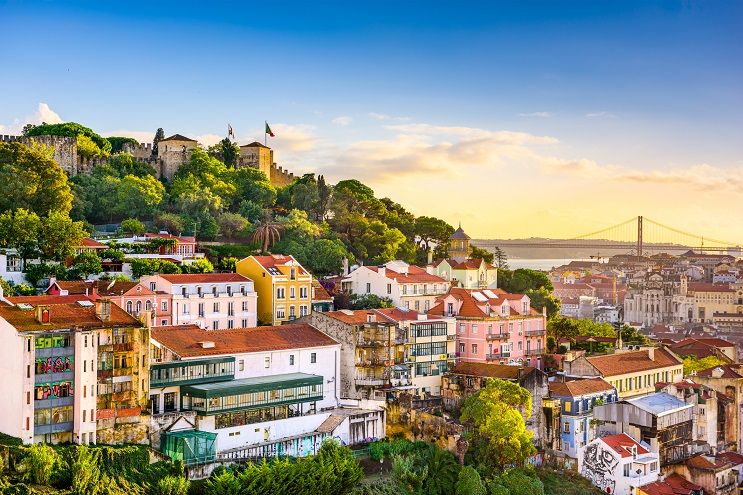Portugal is enjoying something of a purple patch. The economy, once dubbed the sick man of Europe by The Economist, has transformed over the past seven years, lifted by falling unemployment, a boom in tourism and the total elimination of its budget deficit.
The country’s recent good fortunes can clearly be seen in its rapidly falling cost of borrowing. OCED data shows that back in 2012, Portuguese long-term sovereign interest rates exceeded 10.5%. Today, they are lower than 2%.
Economists credit the Portuguese revival with a series of reforms introduced in the wake of the global sovereign debt crisis.
“They didn’t get as much praise as Ireland or Spain, but they were easily as aggressive,” says Azad Zangana, senior economist at Schroders. “Its reforms were put through quickly and were quite painful, but the country has recovered.”
Zangana notes that the past couple of years has seen notable growth in the Portuguese economy, with reasonable wage growth and improvements across multiple sectors ranging from construction, to travel and tourism.
“Over the past couple of years, we have seen a growth rate above 2% per annum,” he says. “More recently, growth has slowed a bit, but that is to do with external demand and world trade. The domestic economy is still doing reasonably well.”
Huge ambition
With the domestic economy in good shape and the financial services sector growing at around 0.7% a year, it is, perhaps, unsurprising that Portugal has ambitions to play a bigger role in Europe’s financial services market.
When investors think about the dominant fund management centres of Europe, Portugal will rarely feature. But last year, the country launched an audacious bid to bolster the number of fund managers selling funds there, simplifying and accelerating the country’s authorisation process.
In a presentation to the investment industry in September, the country’s regulator, the Portuguese Securities Market Commission (CMVM), outlined plans to slash red tape and incentivise fund firms to come to Lisbon. The regulator effectively sought to clear a path to make Portugal a more attractive European base for fund firms seeking to operate within the European Union.
“I do wonder if this was timed to coincide with Brexit, in an attempt to capture some business from London,” says Zangana. “The issue they may find is there is a lack of skilled workers with which to grow the industry strongly. That has always been an issue.”
So far, the success of the CMVM’s plan has been limited, if growth in assets of Portuguese-domiciled mutual funds is used as an indicator.
At the end of 2016, assets under management stood at €17.2bn, according to figures supplied to Expert Investor by Refinitiv. By the end of May 2019, this had grown modestly to €19.7bn, but is still considerably off the post-crisis peak of €33.6bn in April 2014.
Changing dynamics
Traditionally, Portugal’s asset management market has been heavily dominated by bank network distribution, with Caixagest – the fund arm of Caixa Geral de Depósitos – the largest mutual fund manager.
“In most cases, every Portuguese asset manager belongs to a distributor bank, and that bank’s network accounts for almost all of the fund’s clients,” a spokesman for Santander Asset Management Portugal told Expert Investor.
“Asset managers are trying to follow the main trends of the industry worldwide, adapting to some particularities of the Portuguese market. The industry is trying to digitalise, improve its information flow, supplying clients with more detailed and up-to-date material, and increasing the investment alternatives, focusing, for instance, on thematic investment.”
While it is certainly true that domestic banking groups still account for the majority of the country’s investment management sector, international fund firms are starting to get a foothold too. Global fund brands such as BMO, BlackRock, Schroders and UBS Asset Management all have a presence in Portugal.
Gap in the market
While the arrival of global fund brands may not have yet translated into growth in domestically-domiciled assets under management, the competition has ensured that investment groups are becoming more focussed on innovation.
“Currently demand is focused on mixed funds and income funds,” a spokesman for Santander Asset Management Portugal explains. “Mixed funds allow investors to fully access the benefits of diversification and the expertise of the asset manager and are appealing to investors worldwide.
“Income funds enable the investors to access a dividend periodically, and that is much in demand in an environment of very low interest rates.”
This latter point is noteworthy given that Portuguese investors are typically term-deposit investors. Currently, the low interest rate environmental can be particularly punitive with term-deposit products paying virtually nothing. As a result, fund managers offering products with an income focus are playing an important role in client portfolios.
While these products may not appear particularly dynamic compared to racier wholesale products offered up to investors in London, this is entirely deliberate due to the level of sophistication of the Portuguese retail investor. Santander explains that “financial literacy falls short” which poses “a challenge” to fund firms looking to market new products.
Whether product innovation of Portuguese-domiciled mutual funds will shift in the newly competitive environment remains to be seen, but all the signs suggest that Portugal is now a market that is ripe for disruption.







